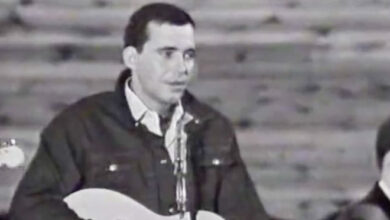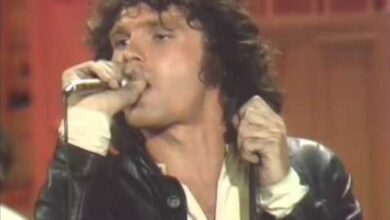Bobby Rydell’s “Forget Him” Marks a Mature Turn and Foreshadows the End of an Era in 1963
Released in late 1963, Bobby Rydell’s “Forget Him” signaled both a personal and generational turning point. For Rydell, a teen idol who had dominated the late ’50s and early ’60s pop charts with his clean-cut charm and upbeat hits, the ballad was a surprising shift toward emotional maturity and vocal restraint. The song peaked at No. 4 on the Billboard Hot 100 and became a major hit in the UK as well, where it reached No. 13. Though it emerged during the final months before the British Invasion would transform American pop forever, “Forget Him” managed to bridge the polished pop crooning of the past with the more introspective songwriting that lay ahead.
Born Robert Louis Ridarelli in Philadelphia in 1942, Bobby Rydell was a product of the city’s rich musical ecosystem, which also nurtured Frankie Avalon and Fabian. With his boyish looks, impeccable phrasing, and ability to appeal to both teens and their parents, Rydell quickly rose to fame in the late ’50s. He scored early hits like “Wild One” and “Volare,” and became a fixture on television, variety shows, and even the big screen. Unlike many of his contemporaries, Rydell had genuine vocal talent and a gift for conveying emotion without melodrama—a skill that would be showcased with particular poignancy on “Forget Him.”
The song itself was written by British songwriter Tony Hatch, best known for his later work with Petula Clark. According to interviews, Hatch penned the song after watching a friend struggle through a painful breakup. Rather than turning the lyrics into a bitter lament, he crafted a piece of gentle encouragement—urging the listener to let go of a man who’s clearly unworthy of her love. It was a message delivered with empathy and subtlety, and it offered a richer emotional palette than many teen pop songs of the day. Hatch originally intended the song for a UK market, but Rydell’s interpretation gave it universal resonance.
Rydell recorded “Forget Him” in London with Hatch himself producing. The arrangement was lush but understated, featuring strings, soft backing vocals, and a rhythm that gently swayed rather than marched. The production steered clear of heavy reverb or overdone orchestration, allowing Rydell’s voice to take center stage. His delivery was both tender and assured, striking a balance between vulnerability and self-possession. It was a notable departure from the lighter, danceable hits he was known for, and it gave audiences a glimpse into his potential as an adult pop singer.
When the single was released in October 1963, it quickly gained traction on American radio. By January 1964, it had climbed to No. 4 on the Billboard Hot 100, marking Rydell’s final Top 10 appearance in the U.S. The song also resonated strongly overseas, becoming a Top 20 hit in the UK and other Commonwealth countries. Its success came just as the pop landscape was on the cusp of radical change. Just weeks later, The Beatles would arrive in America, and the sounds of youth culture would be forever altered.
Culturally, “Forget Him” stands as a poignant bookmark—the last breath of pre-British Invasion American pop. Its emotional tone and polished structure reflect the last days of an era when crooners and clean-cut heartthrobs ruled the charts. At the same time, its lyrical theme of emotional independence, particularly for female listeners, hinted at changing social attitudes. Unlike many love songs of its time, “Forget Him” encouraged self-respect and letting go, not pining endlessly for an unworthy partner.
For Bobby Rydell, the song marked both a peak and a farewell of sorts. Though he would continue to record and tour, the chart dominance he once enjoyed was soon eclipsed by newer artists and changing trends. Yet the success of “Forget Him” reinforced his versatility and staying power. He transitioned into nightclub performances and musical theater, building a second act to his career that few teen idols managed to achieve. The maturity he brought to the song helped him age gracefully as a performer, even as the spotlight shifted elsewhere.
The influence of “Forget Him” extended beyond Rydell’s own career. It’s widely acknowledged that the song inspired Paul McCartney’s composition of “She Loves You,” The Beatles’ early hit. The theme of advising someone on love from a third-person perspective—an unusual approach at the time—can be traced directly back to “Forget Him.” McCartney himself admitted as much in interviews, highlighting how Rydell’s hit subtly shaped the emotional architecture of early Beatles songwriting.
While the song hasn’t been covered as extensively as other hits from the early ’60s, it remains a favorite among collectors and historians. Its most notable cover came decades later from British crooner Cliff Richard, who offered his own heartfelt rendition. Yet no version has matched the sincerity and balance of Rydell’s original. It remains his most emotionally resonant recording, a staple on retro playlists and compilations that chronicle the pre-rock golden era of pop vocals.
In the months surrounding its release, Rydell also faced the challenges of aging out of teen stardom. As his contemporaries were being swept aside by the cultural storm of the British Invasion, he managed to keep a foothold by pivoting to live performance and taking creative risks. “Forget Him” became a centerpiece of those live shows—a song that didn’t just reflect his talent, but also his resilience and evolution as an artist.
Today, the song is remembered as one of the last great hits of the early ’60s pop scene—a record that holds its own among the classics of its era. It continues to receive airplay on oldies stations and is often cited in retrospectives exploring the transition between the innocence of ’50s pop and the more complex terrain of late ’60s rock and soul.
Musically, it helped validate the idea that teen idols could mature artistically. Rydell’s performance was not only vocally strong—it was emotionally intelligent. In a time when many pop stars were manufactured for momentary fame, “Forget Him” proved that sincerity and subtlety still had a place on the charts.
Although Bobby Rydell passed away in 2022, his legacy remains preserved in songs like this one—tracks that combine timeless melody with emotional truth. While his earlier hits captured the excitement of youth, “Forget Him” captured its first taste of heartbreak and growth, delivered with grace and warmth.
In the grand arc of pop music history, “Forget Him” may not carry the same weight as the revolutionary hits that followed it—but its significance lies in its timing, its tone, and its voice. It was a song that gently closed a chapter, both for Bobby Rydell and for a musical generation that would soon give way to something entirely new. And for that reason, it still matters.



